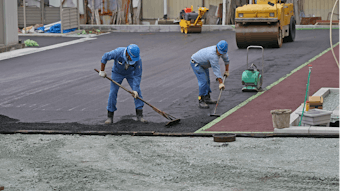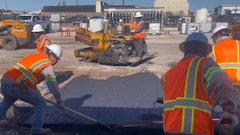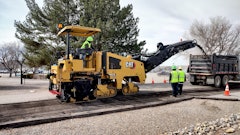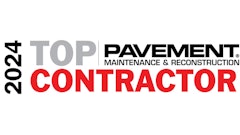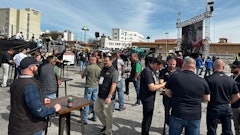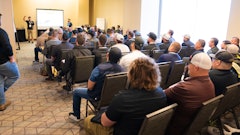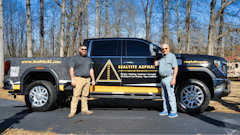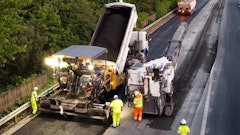
But that’s exactly what happened to Supreme-Metro, South Plainfield, NJ, Pavement Maintenance & Reconstruction’s 2018 Contractor of the Year.
A company built on strong core values, dedicated employees and a culture it reinforces daily, Supreme-Metro Corp. measures its success by monitoring employee turnover and customer retention – and turnover is low and retention is high.
“It’s all about the culture which we create and reinforce each day,” says Jason Ciavarro, President. “It’s not a flip-of-the-switch process.”
Supreme-Metro has created an employee-focused environment that makes working for the company a career and that provides employees a path for professional growth. On-the-job training is supplemented by formal training sessions, and salary is tied directly to skills mastered. Customer retention starts with creating a memorable and positive experience from the first customer contact through invoicing and beyond and is integral to the core values and culture.
In 2017 Supreme Metro was approached by private equity firm Dubin Clark. Their vision was to acquire Supreme Metro as one of the cornerstones in forming Advanced Pavement Group, the foundation to building a strong regional company to serve the Mid-Atlantic and Northeast.
“This relationship has brought new thinking to our organization,” Ciavarro says. “As we expand into a regional or even national enterprise it opens up broader career paths for our employees and provides greater value to our clients.”
Defining and Reinforcing Core Values
“As we continue to grow, a lot of our focus will be on remaining true to our core values – customer service, quality work and education for employees,” says Patti Ventura, executive vice president.
“We’re committed to our employees, we’re dedicated to our customers and we’re determined to provide a cost-effective solution while achieving the customer’s goals,” Ciavarro says.
But those goals can’t be achieved without the buy-in of the people who execute the work, which is why Ciavarro, Ventura and the rest of the management team constantly work to create “a culture that ties back to our core values.”
The core values on which the culture is based are:
· Building trust internally and externally. “Once you build that trust – with employees and with customers -- you have a solid base on which to build,” he says.
· Mastering conflict, both internally and externally. Ciavarro says Supreme-Metro’s approach to mastering internal conflict can involve “passionate conversations. You work closely with the same people every day and there will be a problem eventually,” he says. “Are you going to chew on it all day or pull that person aside and have a conversation?” Ventura says the same holds true with customers, though those conversations tend to be a little less “passionate.” “If their understanding of a project and our understanding of a project differ, we sit down and we discuss it. We never ignore it,” she says.
· Achieving commitment. “Everybody has to buy-in to the process,” Ciavarro says. “Do you believe in the leadership or are you just following because you are told to?”
· Embracing accountability. “It’s difficult sometimes," Ventura says. "We hold ourselves and each other accountable when necessary.”
· Focusing on results. “You can’t really focus on results until you have the other elements in place. And once those are in place the results will follow,” he says.
Ciavarro says that Supreme-Metro has relied on Giselle Chapman, Chapman Business Solutions, a regular presenter at National Pavement Expo, to guide them on developing a culture that reflects those values and implementing systems that enable that culture to thrive.
Investing in Employees
“The biggest problem facing contractors today is how to attract workers and how to retain them,” Ciavarro says. “We’ve always believed we’re as strong as our weakest link. So the challenge is how do we get our employees to engage?”
One way, he says, was the hiring 15 years ago of Ventura, whom Ciavarro terms the “matriarch” of the company. “Patti joined and helped with this because it’s not something we were doing. We never took the time to do it and she did.”
And they’re sure it’s time that has been well spent.
“We’re firm believers that if you create an environment that is beneficial for the employee and you give them a growth path, then other obstacles can be overcome,” Ciavarro says, emphasizing that it’s essential to invest in your employees.
“Why should a contractor invest in his employees if they’re just going to take what they learn and leave? I’d suggest that contractors who are not investing in their workers take a look at their retention rate and see what that looks like. The answer is right there,” Ciavarro says.
Ventura says the employee-focus starts with a competitive compensation plan, strong health benefits (including three plans for different employee situations), flex spending, an IRA with company match, once-a-year boot reimbursement “because we want their feet safe and comfortable out on the job,” in-season vacation for longer-term employees, three PTO days for seasonal workers, and educational opportunities.
And both Ciavarro and Ventura think it’s the educational opportunities, and the career paths those opportunities open, that make the biggest impact on Supreme-Metro workers. Once Supreme-Metro has identified a person they want as an employee, they try to figure out how to get that person to the next level – whatever that means for that individual. “That’s strengthening your weakest link,” Ciavarro says.
Among their approaches are service-specific training classes, National Pavement Expo conference sessions, and training classes specific to a manufacturer such as those offered by Caterpillar and Roadtec.
Each year Supreme-Metro’s management team identifies the employees who would benefit from classes, then matches them up with classes. “We can’t send everyone every year so we examine our workforce and decide who we should invest in and where we should send them,” he says. “We rotate which employees we send every year.”
Ciavarro says the company relies on a formal on-the-job training program, starting most new hires working in our maintenance divisions. “That’s where they enter the training and the company and that’s what they need to master before they shift to more heavy construction type services,” Ciavarro says. “The goal is to graduate them up.”
To encourage development Supreme-Metro offers a pay raise for each new skill mastered. “The employee starts out earning X dollars for X skills and their salary goes up as they gain more skills,” Ciavarro says. “Raking, rolling, and spraying sealer are each skills, for example, and workers get salary bumps when they master each one. It gives them something they can aim for and actually reach, and each time they reach it they are rewarded.”
“We try to keep employees incentivized to stay with the program,” Ventura says. “By doing that we think we have a better understanding of each of our employees and have a better pulse on their progress. When we started this we didn’t know if it would work but it’s been very successful evidenced by a higher retention rate. We’ve tried to make it a total package and it really has worked.”
Ventura says Supreme-Metro also has instituted a structured on-boarding process for new employees, which is something the organization is proud of. The on-boarding includes safety training, yard training, and a tour of the office with an opportunity to meet all the office staff, which Ventura thinks has made an impact.
“They interact with staff and field personnel from the start. Regardless of the position an individual is hired for, they know all the players.” Ventura says. “So we create a connection between the field and the office. It provides connectivity when problems arise.”
Reaching Out to High Schools
One element of the Supreme-Metro program, begun three years ago, involves outreach to local high schools. Ventura works with guidance counselors to identify students who might be interested in working construction and who would benefit by it. Supreme-Metro has hired several high school students each year and placed them in what is essentially an informal apprenticeship program where they can learn the skills they need to succeed, learn about the industry and, perhaps most importantly, see a path to career development.
“They’re being trained by someone in an exit strategy situation – it’s a mentoring program, if you will,” Ventura says. “This does a couple of things: It gets the young employees good training and it enables us to help retain the knowledge that those experienced people would otherwise be taking with them when they retire.
“On-the-job training is key,” she says. “OJT is the basis of our program and the students are learning constantly and every day. It’s a systematic process that starts with a shovel then once they learn that they move to the rake and so on.”
She says that all four students brought in three years ago are still with the company.
“There are plenty of kids out there who don’t know their path or who don’t want to go to college. We’re trying to help them realize that people can have a great career in construction,” Ventura says. ”College is great for many people but it’s not for everyone and it’s expensive. If they can understand that there are jobs in construction beyond running a shovel then they might have an interest in pursuing a career in construction.”
Ventura says this process is used for all new hires, not just high school students. People who come in as new hires start at their individual skill level and work up from there. Unskilled workers start in asphalt maintenance but workers already adept at certain skills start at a different level and at a higher wage.
“We think we’ve honed in on something here,” she says. “We are focused on getting better-quality employees and it seems to be working.”
Providing the “Wow” factor for Customers
Ciavarro says that in New Jersey’s ultra-competitive market Supreme-Metro’s goal is to be memorable to the customer and to provide the customer with what he terms “the Wow factor.” He says the company’s organizational structure is designed to provide that “Wow” factor from start to finish.
“That doesn’t come just from sales, it comes from within the entire organization,” he says. “Our customers have many choices so we have to do everything we can to make sure they choose us.
“It all starts with the first encounter with the customer,” Ciavarro says. “Doing our research on the customer and asking the right questions at the walk-through are the keys to a successful first impression and understanding of what it is they’re looking for.”
The next step is gathering all the field data, then bringing it back and entering it into their estimating software and CRM (Supreme-Metro relies on Salesforce, which Ciavarro says they “absolutely couldn’t live without”) to produce job maps and specifications. All work is done electronically, and any time there’s a question or change in the project it’s recorded electronically.
When the job nears, Supreme-Metro holds a pre-con meeting with the customer, operations team and vertical leaders. (There is one vertical leader for each of three service segments: asphalt, concrete and asphalt maintenance. The leaders meet weekly with the five-person management team and are tasked with monitoring development of new employees, job progress including profitability for all projects within their silo, and customer satisfaction.) At this meeting not only are the job parameters discussed but safety concerns and customer expectations are highlighted.
Foremen and superintendents orchestrate the project once it’s underway – and customer service becomes the responsibility of the vertical leader. Ciavarro says that allows for a true handoff to a key management leader who is trained in their area of expertise to customer service.
“How do you make sure the customer has the same positive experience when you hand the job off from sales? You assure it by making the vertical leader the single point of contact for the customer,” Ciavarro says. “They are the ones that allow this seamless process and are in direct contact with the customer for the duration of the project.”
Forming the Advanced Pavement Group
When Dubin Clark approached him a year ago, Ciavarro says he was surprised.
“They came to us. That kind of thing never happens to contractors,” he says. “To be in the lens of a private equity company speaks mountains about what we’re doing here.”
He says he soon realized that partnering with an established firm would enable Supreme-Metro to expand beyond New Jersey. Currently Supreme-Metro is in the midst of rebranding itself as Advanced Pavement Group (APG), and Ciavarro says he is looking forward to leveraging APG across a broader market.
“This partnership builds upon the partnering companies’ core foundations, setting the stage for many years of growth and increased customer service throughout the Northeast,” Ciavarro says. “While our name is in the process of being rebranded to Advanced Pavement Group, the leadership and employees of Supreme Metro have not changed.”
He says the relationship has already brought in new technology, new training and new opportunities for Supreme-Metro workers. He says that from an operations standpoint nothing has changed, though from a management standpoint there has been an increased emphasis on budgeting.
“It’s been quite a ride since last February,” Ventura says. “But as we’re continuing to grow we’ve remained true to our culture. We made sure our culture wasn’t violated because that’s what made us what we are, and our investors have embraced our core values and are working to get other parts of APG to become more like us.”
Ventura says the support of Dubin Clark has resulted in a more corporate environment that she thinks will help the company. “I’m now surrounded by people who have much more experience than I and I’m excited about that. It’s a breath of fresh air to have people who look at things at a different level and think about things in a more strategic way. It’s enabled us to grow much more quickly.”

